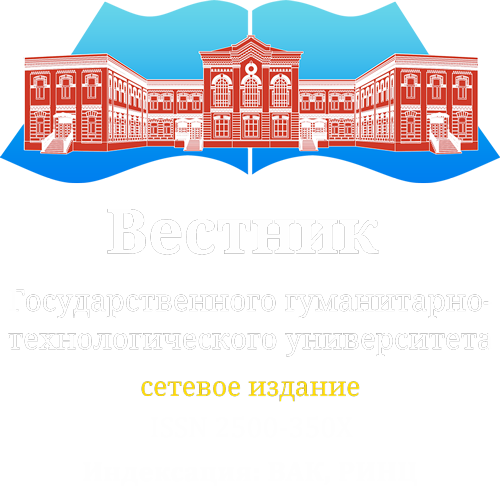Вестник Государственного гуманитарно-технологического университета. 2021. № 4. С. 152–157. ISSN 2500-350X (online)
Vestnik of State University of Humanities and Technology. 2021. no 4. P. 152–157. ISSN 2500-350X (online)
Научная статья
УДК 821.161.1-3:79
💾 ИДЕЙНО-ХУДОЖЕСТВЕННОЕ СВОЕОБРАЗИЕ ФИЛЬМА-СПЕКТАКЛЯ «ДВОЙНИК» (1989) – ЕДИНСТВЕННОЙ ОТЕЧЕСТВЕННОЙ ЭКРАНИЗАЦИИ ПОВЕСТИ Ф.М. ДОСТОЕВСКОГО Сергей Николаевич Роман 1Государственный гуманитарно-технологический университет, Орехово-Зуево, Россия, berbertolu44i@mail.ru, https://orcid.org/0000-0001-9452-6713
Аннотация. В настоящее время одним из наиболее актуальных вопросов исследования творчества Ф.М. Достоевского является изучение специфики отображения его художественного мира в многочисленных экранизациях. В данной статье впервые системно рассматривается идейно-художественное своеобразие фильма-спектакля «Двойник», на данный момент являющегося единственным отечественным воплощением «петербургской поэмы» на экране. В отличие от зарубежных кино- и телепроектов в отечественном спектакле происходит отказ как от переноса действия в настоящее время, так и от использования авангардного киноязыка. Актёрская игра соответствует традициям русского психологического театра, лишена шаржированности, стремления к психоделической подаче материала. Делается вывод, что всё это в сочетании с отказом создателей спектакля от динамических сцен и от озвучивания слов автора приводит к тому, что идейное содержание повести во многом сводится к сатире на чиновничью жизнь XIX века. Внутренний конфликт главного героя оказывается малозначительным, а его кругозор и уровень рефлексии сознательно занижаются, в результате чего Голядкин-старший оказывается «маленьким человеком», предельно близким к персонажам А.С. Пушкина и Н.В. Гоголя, лишённым своеобразия, характерного для творческого видения Ф.М. Достоевского.
Ключевые слова: экранизация, повесть, фильм-спектакль, идейно-художественное своеобразие, сатира, двойничество, советское искусство
Для цитирования: Роман С.Н. Идейно-художественное своеобразие фильма-спектакля «Двойник» (1989) – единственной отечественной экранизации повести Ф.М. Достоевского // Вестник Государственного гуманитарно-технологического университета. 2021. № 4. С. 152–157.
SUMMARY
IDEAL AND ARTISTIC PERSONALITY OF THE FILM-PLAY "DOUBLE" (1989) - THE ONLY DOMESTIC SCREENING OF THE STORY BY F.M. DOSTOEVSKY
Sergey N. Roman
State University of Humanities and Technology, Orekhovo-Zuevo, Russia,berbertolu44i@mail.ru, https://orcid.org/0000-0001-9452-6713
Abstract. At present one of the most pressing issues in the research of F.M. Dostoevsky is the study of the specifics of the display of his artistic world in numerous film adaptations. This article for the first time systematically considers the ideological and artistic originality of the film-play "The Double", which is currently the only domestic embodiment of the "Petersburg poem" on the screen. In contrast to foreign film and television projects, in the domestic performance there is a refusal both from the transfer of action to the present, and from the use of the avant-garde cinema language. The acting game corresponds to the traditions of the Russian psychological theater, is devoid of caricature, the desire for a psychedelic presentation of material. It is concluded that all this, combined with the refusal of the creators of the play from dynamic scenes and from the sounding of the author's words, leads to the fact that the ideological content of the story is largely reduced to satire on the officials’ life of the 19th century. The internal conflict of the protagonist turns out to be insignificant, and his outlook and level of reflection are deliberately underestimated, as a result of which Golyadkin Sr. turns out to be a "little man", extremely close to the characters of A.S. Pushkin and N.V. Gogol, devoid of the originality characteristic of the creative vision of F.M. Dostoevsky.
Key words: film adaptation, story, film-performance, ideological and artistic originality, satire, duality, Soviet art
For citation: Roman S.N. Ideal and artistic personality of the film-play "Double" (1989) - the only domestic screening of the story by F.M. Dostoevsky // Vestnik of State University of Humanities and Technology. 2021. no 4. P. 152–157.
Информация об авторе
С.Н. Роман – кандидат филологических наук, доцент кафедры истории и гуманитарных наук Государственного гуманитарно-технологического университета.
Information about the author
S.N. Roman – Ph.D. of Philology, Associate Professor of the Chair of History and Humanities, State University of Humanities and Technology.
Статья поступила в редакцию 20.10.2021; одобрена после рецензирования 25.11.2021; принята к публикации 10.12.2021.
The article was submitted 20.10.2021; approved after reviewing 25.11.2021; accepted for publication 10.12.2021.
